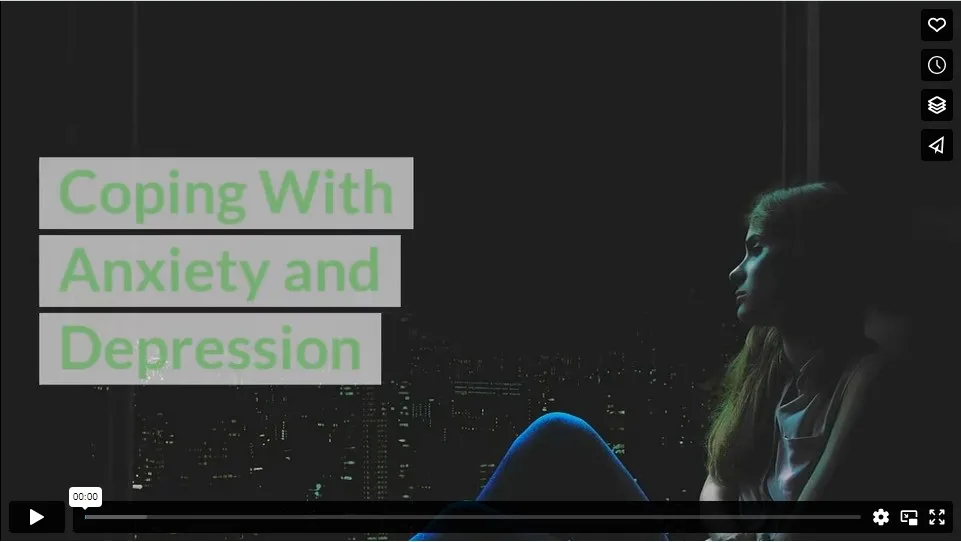According to the CDC, 18.5% of adults experienced depression symptoms in 2019. Almost half of those suffering from depression are also suffering from uncontrolled anxiety. If left untreated, anxiety may be the catalyst for your depression. This creates a cycle where both disorders feed off one another, increasing the severity of your symptoms.
How Does Anxiety Lead to Depression?
The occasional heart-racing spurt of anxiety is an expected part of life. When you have a work deadline, conflict, school exam, or a significant change like a move, it’s normal for you to feel anxious. However, anxiety disorders are present when the fight-or-flight center in your brain turns on with no real reason to feel that way. You may constantly feel in danger and on alert with invisible threats looming. You can recognize your thoughts as irrational, but you can’t stop them or the way your body reacts to them. When you start to feel like you are losing your inner control, depression creeps in.
When You Already Have Both
Your doctor should individualize your treatment for each mental health problem. Typically, you should begin by addressing the problem causing the most distress and issues in your daily life. Still, it is often difficult to tell which symptoms are more debilitating – depression or anxiety. You and your treatment team can tailor treatments to your symptoms so both your depression and anxiety will reduce together:
● Set Personal Goals: Have you set out to do something and never been able to achieve it? Start by setting yourself up for success with SMART goals: Specific, Measurable, Attainable, Relevant, and Time-based. Creating a step-by-step plan with these attributes will help make it happen.
● Organize: Your physical surroundings have a huge impact on your mental health. Reducing the clutter will help put your mind and body at ease. Try to plan to eliminate one area at a time so it isn’t so overwhelming.
● Find a Meaningful Cause: The activity doesn’t have to be charitable, just something that is important to you. It can range from athletics to volunteering, or combine the two by coaching kids’ sports. Find something to give you a sense of purpose and add structure to your week.
● Get Creative: By focusing your energies on something constructive, you may discover an interest that will help your mind relax. Concentrating on new skills can lead to a relaxed mind where your self-awareness is lost temporarily. It can also give you a sense of purpose and control of the situation.
● Relaxation: Breathing exercises, meditation, or yoga can lift your mood and decrease your anxiety. Losing yourself in a book can also relax you, and some research suggests that book topics on psychology and spirituality have more mood-boosting effects.
● Exercise: It releases endorphins that boost your mood, increases your confidence and self-esteem, and improves your relationships. Frequent, high-energy activity is best, but even a brisk walk can get your blood pumping and endorphins flowing.
● A Balanced Diet: Comfort foods are often empty carbohydrates with many processed ingredients, which you may crave when you feel anxious or depressed. They provide brief comfort but will worsen your feelings in the long run. Eating lean protein with healthy fats will help you feel calmer and satisfied. Half your plate should contain fruits and vegetables.
Aim for the 80-20 rule. 80% of your meals should be health-conscious with nutrient-rich foods, but don’t completely cut out treats. Depriving yourself can lead to binging these banned foods, and you will feel worse. Try to limit processed sugars, caffeine, and alcohol as they are known to worsen depression and anxiety.
● Seek Out Support: Strong ties to others are proven to help you feel better. These relationships can be with family or friends, and having their encouragement can make a difference. Support groups can also provide some of the same effects as it is helpful to see and hear other people experiencing the same issues as you.
● Talk Therapy: Counseling or more focused therapies such as cognitive-behavioral, interpersonal, or problem-solving can help you develop plans to treat your anxiety and depression and learn coping mechanisms for your symptoms. Typically, doctors use therapy in conjunction with medication.
● Medication: Specific antidepressants can treat depression and anxiety symptoms, such as Prozac, Lexapro, Zoloft, and Cymbalta. If you do not see a positive effect on both from the medication your doctor prescribes, your doctor may want to try an antidepressant and anxiety medication together. It can take a couple of trials to find the right medication combination for both your anxiety and depression. You should speak to your doctor about alternative depression treatment options if your symptoms are still not managed effectively.
● Transcranial Magnetic Stimulation (TMS): If you haven’t responded to other forms of treatment, TMS is a breakthrough treatment for depression and anxiety without medication or sedation. It’s a non-invasive treatment option performed in an outpatient setting with minimal side effects.
If you or someone you know has been suffering from anxiety, speak to a doctor before depression takes hold. There are many effective treatment options for both depression and anxiety. Like other intertwined health problems, simultaneously treating both is more complicated. If talk therapy and medication are not enough to reach remission, speak to your doctor about alternative treatment options, like accelerated TMS for your depression and anxiety.
Infographic
When battling both anxiety and depression, a personalized treatment approach is crucial. The first step involves prioritizing the issue that causes the most distress and interference in daily life. However, discerning which symptoms are more debilitating can prove challenging. Collaborating with your treatment team enables tailored interventions, ensuring a simultaneous reduction in both depression and anxiety.

Video

